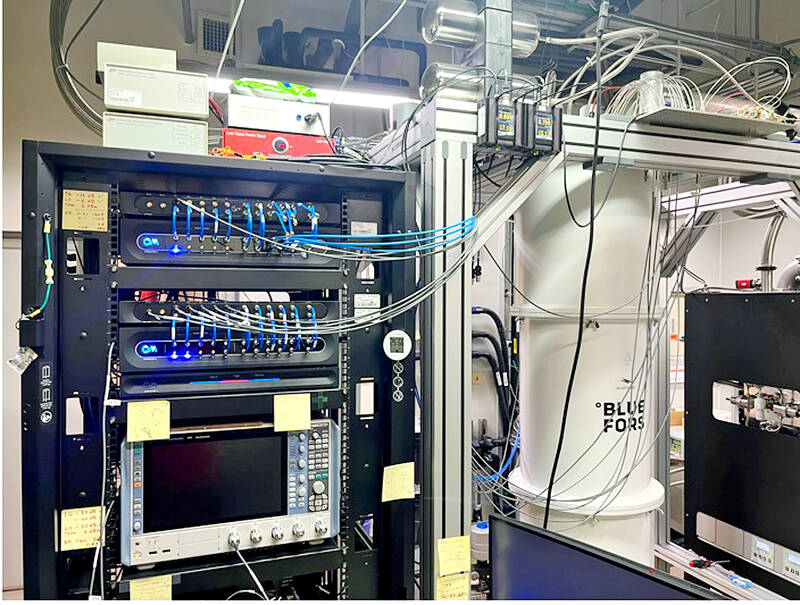Taiwanese researchers have successfully developed 5-quantum-bit (qubit) chips, marking a milestone in the nation’s quest for quantum computer technology, members of Academia Sinica told lawmakers during a Legislative Yuan session on Thursday.
The technology was successfully developed a few months ago and scientists expect to be able to build a quantum computer utilizing the technology before next year, said Lee Chau-hwang (李超煌), executive secretary of the institute’s Central Academic Advisory Committee.
The computer would be put on a cloud system to help the nation’s research institutions and access to the machine would be broadened in the coming years, he said.

Photo courtesy of Chen Chi-tung, Institute of Physics, Academia Sinica
Academia Sinica made the breakthrough in collaboration with Taiwan’s tech sector, foreign experts and the Industrial Technology Research Institute, Lee said, adding that 10 percent of the funding came from overseas sources.
Computers with quantum chips would reach a much higher speed of computation than other supercomputers, which makes quantum computer research a closely guarded secret in many nations, Lee said.
This means Taiwan cannot simply transfer quantum computing technology from another country and must develop the technology itself, he said.
Quantum computing would enable the simulation or analysis of more complex phenomena than before, Lee said.
The technology might allow the making of accurate economic forecasts or predicting traffic bottlenecks, he said.
However, applied quantum computing for everyday problems would not be possible in the short term, Lee said.
The national consortium for quantum computing had initially planned to roll out Taiwan’s first quantum computer in 2025, but the work was hastened in response to fierce international competition, said Luo Meng-fan (羅夢凡), head of the National Science and Technology Council’s Department of Natural Sciences and Sustainable Development.
The initial goal was for the research team to achieve 2-qubit chips by the end of the year, he said.
The next challenge is to develop other technologies such as low-temperature electronics, microwave controllers, and the interface and software that goes into a fully operational quantum computer, he said.
Separately, Luo said a generative artificial intelligence (AI) risk assessment team has been established at Academia Sinica following the closure of the controversial CKIP-LLama-2-7b program, which had utilized China-based data for AI training.

A relatively large earthquake may strike within the next two weeks, following a magnitude 5.2 temblor that shook Taitung County this morning, the Central Weather Administration (CWA) said. An earthquake struck at 8:18am today 10.2km west of Taitung County Hall in Taitung City at a relatively shallow depth of 6.5km, CWA data showed. The largest intensity of 4 was felt in Taitung and Pingtung counties, which received an alert notice, while areas north of Taichung did not feel any shaking, the CWA said. The earthquake was the result of the collision between the Philippine Plate and the Eurasian Plate, the agency said, adding

Snow fell in the mountainous areas of northern, central and eastern Taiwan in the early hours of yesterday, as cold air currents moved south. In the northern municipality of Taoyuan, snow started falling at about 6am in Fusing District (復興), district head Su Tso-hsi (蘇佐璽) said. By 10am, Lalashan National Forest Recreation Area, as well as Hualing (華陵), Sanguang (三光) and Gaoyi (高義) boroughs had seen snowfall, Su said. In central Taiwan, Shei-Pa National Park in Miaoli County and Hehuanshan National Forest Recreation Area in Nantou County saw snowfall of 5cm and 6cm respectively, by 10am, staff at the parks said. It began snowing

HOLIDAY EXERCISE: National forest recreation areas from north to south offer travelers a wide choice of sights to connect with nature and enjoy its benefits Hiking is a good way to improve one’s health, the Forestry and Nature Conservation Agency said, as it released a list of national forest recreation areas that travelers can visit during the Lunar New Year holiday. Taking a green shower of phytoncides in the woods could boost one’s immunity system and metabolism, agency Director-General Lin Hwa-ching (林華慶) cited a Japanese study as saying. For people visiting northern Taiwan, Lin recommended the Dongyanshan National Forest Recreation Area in Taoyuan’s Fusing District (復興). Once an important plantation in the north, Dongyanshan (東眼山) has a number of historic monuments, he said. The area is broadly covered by

Global bodies should stop excluding Taiwan for political reasons, President William Lai (賴清德) told Pope Francis in a letter, adding that he agrees war has no winners. The Vatican is one of only 12 countries to retain formal diplomatic ties with Taiwan, and Taipei has watched with concern efforts by Beijing and the Holy See to improve ties. In October, the Vatican and China extended an accord on the appointment of Catholic bishops in China for four years, pointing to a new level of trust between the two parties. Lai, writing to the pope in response to the pontiff’s message on Jan. 1’s